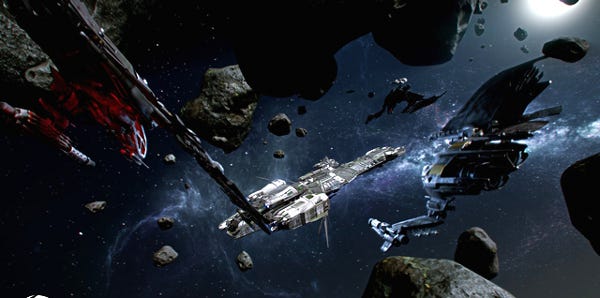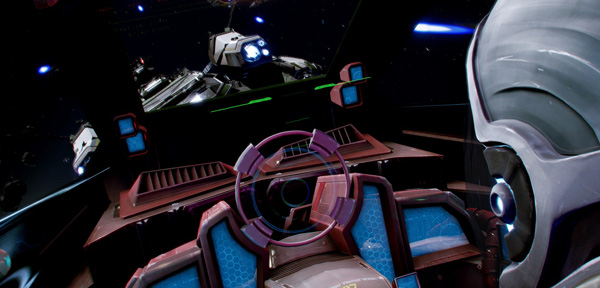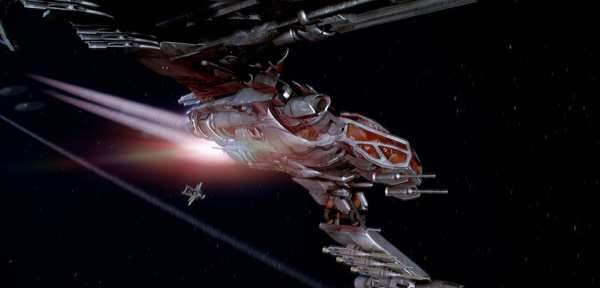Star Citizen's Big Influences: Demon's Souls, Real Life
Star Citizen – the newest and spacest thing from mighty commander of all wings, Chris Roberts – sounds impossibly good. And I do mean that, but with more emphasis on the “impossible” part than I'd like. No doubt, Roberts is completely brilliant, but he's proposing a project of utterly mad ambition. Naturally, it's made me a bit skeptical. That said, an hour-long chat during GDC Online (the full results of which you'll see very soon) definitely put a few of my fears at ease. Roberts is dreaming bigger than just about any other designer out there, but his pie-in-the-stars ambitions are actually pretty well-grounded in reality. And also Demon's Souls, surprisingly enough.
Star Citizen's scope and scale may sound completely bonkers, but there are limits. Very specific limits, actually. In short, don't go in expecting EVE-Online-style thousand-ship-battle shenanigans. This simply isn't that sort of game.
“The largest amount of people that can be in one area in space is decided by the number of people we can have in combat at once,” Roberts told RPS. “It's not 100 percent fully determined, but it's going to be between 60 and 100-some-odd people. So if there were 10,000 people in orbit around Earth, that'd be 100 different instances of 100 different people, basically.”
“Essentially, the persistent universe is doing the matchmaking. It keeps track of where you are in the galaxy, how much money you've got, what ship you've got – and obviously, that's not completely real-time. If we wanted to, the persistent universe could be handled by some sort of boring web interface. But that's not the sort of stuff I like to do. So the persistent universe detects that you and another player are moving one way, and he's a pirate and you're a merchant, and you're going to intersect. So it basically creates an instance that's dynamic and puts you two into it until you resolve your conflict. It will allow other players to drop into it. There'll be slots saved for your friends, so you'll be able to message them and say, 'Hey, I'm under attack! If anyone's close by, come help me out.'”
"It's a different level of scope [than EVE]. That's why it's called 'Star Citizen' and not 'Earth and Empire' or something. It's more about that personal view than some big political campaign.”
He noted, then, that Squadron 42 – Star Citizen's non-persistent spin-off – will be a lot like World of Tanks, but with an overarching narrative. Further, in response to one of Richard's concerns, he explained that Squadron 42 is actually first on the list of priorities, as Star Citizen's persistent world technology will eventually be layered on top of it to create a separate game. "Actually, if someone were to ask me, 'Chris, can you really get this all done?' it wouldn't be about getting the Squadron 42 stuff done. It'd be whether or not I can get the full vision of the world going. That's the biggest challenge," he said.
Roberts assured me, however, that his ultimate goal is still to simulate a living, breathing galaxy as accurately as possible. And that goal manifests everywhere: in economics, upholding the law, and, er, insurance.
“I'm actually sort of bummed by the current design philosophy where there's no penalty for not doing particularly well,” Roberts lamented. “In a lot of games I play – especially the console ones – I don't play particularly smart, because when I respawn, I'm like a second away from where I died. So I go in guns blazing and basically bully my way through the story. I really like [console-only Dark Souls predecessor] Demon's Souls, though. It was a combination of the most frustrating and rewarding game I've played in a long time.”
“So in this, I don't think we're gonna be quite as tough as Demon's Souls, but there needs to be some penalty. You won't be able to just blast away and then respawn again. So if you go out in space and your ship gets destroyed, you've lost it. But basically, we're trying to do a lot of things like the real world, so we're trying to simulate an economy and you can buy ship insurance and cargo insurance. So, if you're smart, you'll pay a little money for insurance. Normally, if you get blasted, you'll lose your cargo, but you'll end up on the same planet to get a replacement ship. If you don't have ship insurance, you'll lose it all. I mean, insurance is not going to be that expensive, but it certainly shouldn't be easy.”
He added that insurance costs will be higher at the edge of the galaxy, because “it's just like if you're living in a really bad neighborhood.” So you'll definitely want insurance in that sort of no-man's-land, but you might be able to get by without it if you decide to cling to Earth like it's a gigantic, eons-old safety blanket. That said, Earth will also impose higher tariffs and trade taxes, whereas the lawless frontier keeps things quick, loose, and sans paper trail. But, just putting it out there, you'll probably die. Roberts' hope, then, is that a system of trade princes, space crime lords, bounty hunters, and everything in between will arise from that. So yeah, there may be some smoke-and-mirrors involved, but it still all sounds totally mad. Not that you'll hear Roberts complaining if you tell him as much.
"Well," he grinned, "no one ever accused me of being unambitious."
Check back later this week for the full, extremely lengthy interview. It will finally set to rest your overwhelming fears that Roberts might suddenly cease developing games to pursue a life of organized space crime. And also, it might answer a few more of your burning questions about Star Citizen. Maybe. If it feels like it.


